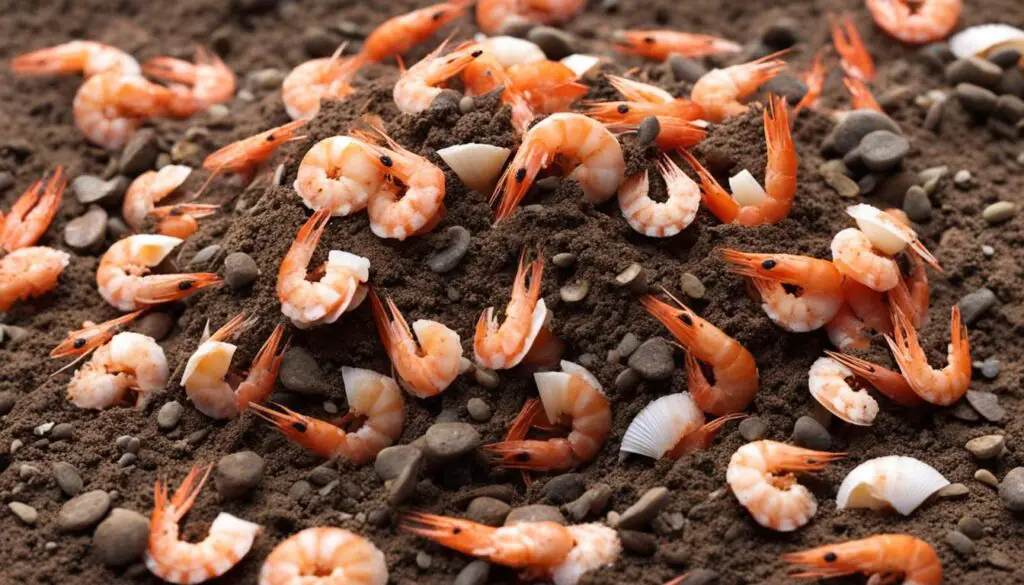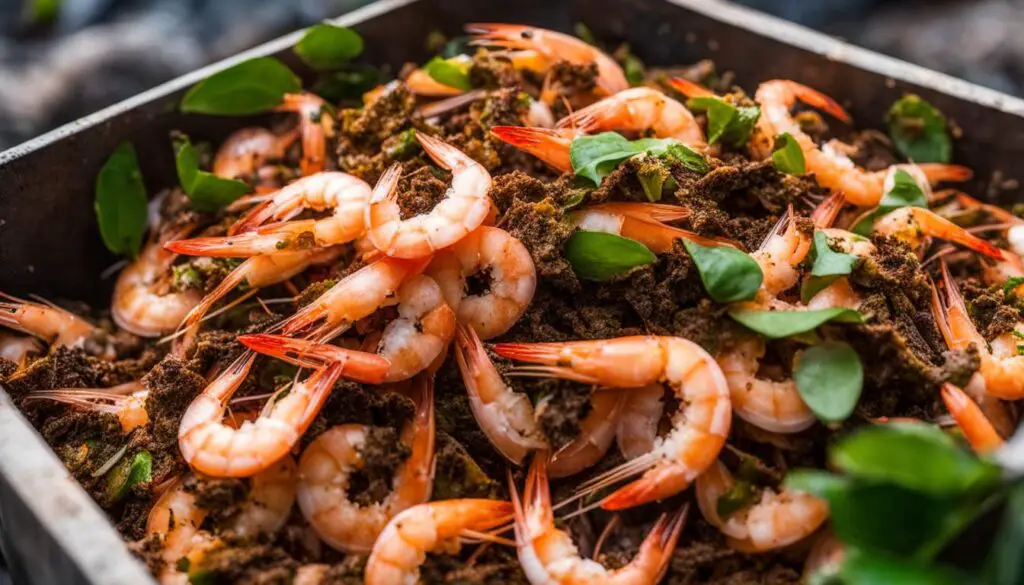Can shrimp shells go in compost? Is composting shrimp shells a good idea? These questions often arise when it comes to recycling kitchen waste, especially seafood waste. In this article, we will explore the potential benefits of composting shrimp shells and how they can contribute to sustainable gardening practices.
Key Takeaways:
- Shrimp shells can be composted in regular backyard compost piles or bins.
- They are rich in nitrogen and considered a green material in composting.
- Composting shrimp shells has several benefits, including providing essential nutrients for plants and contributing to the overall health of the soil.
- The decomposition process of shrimp shells can vary depending on the temperature of the compost pile.
- Proper preparation, such as rinsing and drying, can enhance the effectiveness of composting shrimp shells.
- Composting shrimp shells is a sustainable practice that helps reduce waste and produces a natural fertilizer for your garden.
The Benefits of Composting Shrimp Shells
Composting shrimp shells offers numerous advantages for your garden and the environment. Let’s explore the key benefits of incorporating these crustacean remnants into your compost pile:
Nitrogen-Rich Compost Material
Shrimp shells are a valuable source of nitrogen, a crucial nutrient for plant growth. Composting shrimp shells ensures that this nitrogen is released into the soil, providing essential nourishment to your plants. The decomposition process breaks down the chitin in the shells, releasing nitrogen that becomes readily available for plant uptake. By adding shrimp shells to your compost, you enrich the nutrient content, promoting healthier and more vibrant vegetation.
Antifungal Properties
In addition to their nitrogen-rich composition, shrimp shells possess natural antifungal properties. These properties can help protect your plants from fungal infections, enhancing their overall resilience. By introducing shrimp shells into your compost, you create an environment that actively counters fungal growth, contributing to the long-term health of your garden.
Metabolic Benefits to Plants
Shrimp shells contain various compounds that offer metabolic benefits to plant life. The chitin and other organic materials in the shells stimulate beneficial microbial activity in the soil, promoting nutrient cycling and plant growth. These metabolic benefits optimize the uptake and utilization of nutrients, resulting in stronger, more robust plants. Incorporating shrimp shells into your compost encourages a thriving ecosystem in your garden, fostering the growth of beneficial organisms that support overall plant health.
Composting shrimp shells holds the following advantages for your garden:
- Provides a nitrogen-rich compost material
- Offers natural antifungal properties
- Enhances plant metabolism and growth
By harnessing these benefits, you can significantly improve the quality and fertility of your soil, resulting in flourishing plants and a vibrant garden.
Composting Shrimp Shells vs. Other Composting Materials
| Benefits | Shrimp Shells | Other Composting Materials |
|---|---|---|
| Nitrogen content | High | Varies |
| Antifungal properties | Present | Depends on material |
| Metabolic benefits to plants | Enhances nutrient cycling | Varies |
| Decomposition time | Relatively quick | Varies |
The Decomposition Process of Shrimp Shells
The decomposition process of shrimp shells plays a crucial role in determining the time required for them to break down in a compost pile. Several factors, such as the temperature of the compost pile and the size of the shell pieces, can influence the decomposition process.
In a hot compost pile with internal temperatures at or above 120F, shrimp shells can decompose relatively quickly, typically within 7-14 days. The high temperatures in a hot compost pile accelerate microbial activity, speeding up the breakdown of organic materials, including shrimp shells. Hot composting provides an optimal environment for the efficient decomposition of shrimp shells and other compostable materials.
On the other hand, in a cold compost pile that is not actively managed, the decomposition process is slower. Shrimp shells, in this case, may take several months to break down completely. Cold composting relies on ambient temperatures and natural decomposition processes, which are less efficient compared to hot composting. However, even in a cold compost pile, shrimp shells will eventually decompose, contributing to the overall composting process.
To enhance the decomposition process of shrimp shells, it is beneficial to crush them into smaller pieces. This increases the surface area available for microbial activity, allowing for faster decomposition. Smaller shell fragments also mix more easily with other compostable materials, ensuring a more homogeneous and efficient composting process.

In summary, the time required for shrimp shells to decompose in a compost pile varies depending on the temperature and management practices. Hot composting with high temperatures leads to faster decomposition, while cold composting takes longer. By crushing shrimp shells into smaller pieces, you can further accelerate the decomposition process. Incorporating shrimp shells into your composting routine is a sustainable way to utilize food waste and generate nutrient-rich compost for your garden.
How to Prepare Shrimp Shells for Composting
Before adding shrimp shells to the compost pile, it is important to prepare them properly. Follow these steps to ensure effective composting:
- Washing shrimp shells: If there is any food residue on the shells, rinse them thoroughly to remove oils, sauces, or other contaminants. This step is especially important for those with pest problems or small tumblers that do not generate enough heat.
- Drying shrimp shells: After washing, allow the shrimp shells to dry completely. You can choose between sun-drying or using an oven for faster drying. The shells should be brittle and moisture-free before adding them to the compost pile.
- Crushing shrimp shells: Once dried, you can crush the shrimp shells into smaller pieces or a powder-like texture. Smaller sizes decompose faster and increase the surface area, promoting quicker decomposition in the compost pile.
- Composting with raw shrimp shells: If your compost pile is hot and active, you can add raw shrimp shells directly to the middle of the pile without any further preparation. The heat generated in the pile will facilitate the breakdown of the shells.
By following these preparation steps, you can maximize the benefits of composting with shrimp shells and contribute to sustainable gardening practices.

Note: The image above illustrates the preparation process of shrimp shells for composting.
Conclusion
In conclusion, composting shrimp shells is a fantastic way to create nutrient-rich compost for sustainable gardening while reducing waste. When added to the compost pile, shrimp shells contribute valuable nitrogen and essential nutrients to the soil, promoting the health and growth of plants. Additionally, the antifungal properties of shrimp shells help protect plants from infections, ensuring a thriving garden.
By incorporating composting shrimp shells into your gardening routine, you are not only helping the environment by reducing waste but also producing a natural fertilizer that benefits both the earth and your plants. This sustainable practice supports eco-friendly gardening and contributes to a healthier ecosystem.
So, don’t throw away those shrimp shells! Instead, compost them to create nutrient-rich compost that will nourish your garden, reduce waste, and support sustainable gardening practices. Embrace the power of nature and transform shrimp shells into a valuable resource for your plants and the planet.
FAQ
Can shrimp shells be composted?
Yes, shrimp shells can be composted in regular backyard compost piles or bins.
What are the benefits of composting shrimp shells?
Composting shrimp shells provides a nitrogen-rich compost material, has antifungal properties, and offers metabolic benefits to plants.
How long does it take for shrimp shells to decompose?
The decomposition time of shrimp shells depends on the temperature of the compost pile, ranging from 7-14 days in hot composting to several months in cold composting.
How should shrimp shells be prepared for composting?
Shrimp shells should be properly prepared by rinsing them to remove food residue, drying them, and crushing them into smaller pieces for faster decomposition.
What are the benefits of composting shrimp shells?
Composting shrimp shells helps to create nutrient-rich compost, promotes sustainable gardening practices, reduces waste, and produces a natural fertilizer that benefits both the environment and plants.

